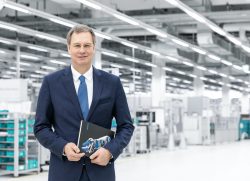
Festo focuses on remote capabilities, AI in mid-year update
July 10, 2020
By Manufacturing AUTOMATION
 Photo: Festo
Photo: Festo Festo is focusing on digitalization, machine learning and artificial intelligence applications during the coronavirus crisis, the company said in a financial update released earlier this week.
Coming off a strong sales year in 2019, the automation company started Q1 2020 in a stable position but saw the effects of the crisis on its business in the second quarter.
“It is difficult for us to predict how the coming weeks and months will develop,” says Dr. Oliver Jung, chairperson of Festo’s management board, in a release. “Just like other companies, we will continue to implement counter measures, and adapt them very flexibly on a global and local scale. We are expecting catch-up effects for the second half of the year.”
Festo has supplied customers globally during the lockdowns, especially to an increased extent in the areas of food, packaging, and pharmaceutical and medical technology. For example, the company is supplying components used in respiratory ventilators and in-vitro diagnostics.
“Our broad-based industrial footing helps us when some segments, such as automotive, are showing decline,” says Jung.
Virtual support
“We realize more than ever that in times of crisis it is crucial to provide our customers with comprehensive virtual support,” says Jung. In response, Festo provided customers and partners with a digital collaboration platform. This platform contains all engineering tools, the online shop, access to all Festo services or the digital maintenance manager Smartenance.
As the virus spread, companies were suddenly confronted with a completely different demand behaviour. Faster availability or suddenly much higher quantities of certain products required companies to be as flexible as possible when converting their production.
The digitalization of automation technology provides a remedy. Components that are intelligently networked independently, self-configuring and thus plug-and-produce capable, enable the systems to meet changing requirements faster.
The necessary data and information is synchronized via cloud services and can be accessed at any time.
In Festo’s global production network, the plants are networked with each other and are in constant exchange.
“Within the network, we have largely been able to compensate for production bottlenecks, for example when plant shutdowns ordered by the authorities occur,” says Dr. Ansgar Kriwet, member of Festo’s management board sales. “This requires a stable and powerful IT infrastructure that can cope with modern possibilities such as cloud data storage, so that all data is available worldwide in near real-time.”
The trend towards intelligently networked production is proving to be crisis-proof and sustainable. A prerequisite for this is the virtualization of products, machines and systems, so that factory workers will also be able to control “their” machine from their home office.
To do this, the machines and systems require a digital twin that is equipped with the same functions as its real counterpart.
Embedded sensor technology enriches the digital twin with process data to provide insight into the internal condition of the machines.
Making good use of AI
Artificial intelligence is characterised by its self-learning ability. The more data available, the better the predictions. As a result, downtimes are reduced and expensive rejects are cut down.
“Artificial intelligence can be used to make predictions about possible failures of individual components or optimization potential available to the machine’s operator,” says Kriwet.
“In combination with human experience, we have already been able to achieve significant efficiency improvements in our own plants.”
To generate added value and increase efficiency with the methods from the algorithmic toolbox, use cases must be precisely defined.
Satisfactory results are only possible if the data are strategically pre-structured and are available in sufficient quantity.
“We have taken a close look at quality assurance with AI in a production process at our own factories and have come to the conclusion that the big data approach from the consumer market is not successful in industry. We only managed to significantly increase efficiency once we united the expertise of the machine operators with the appropriate statistical methods of AI,” says Jung.
Festo says it is currently focusing above all on AI assessments “on edge” – in other words directly on the component – or on location within a production network to ensure real-time assessments and avoid latencies.
With Festo’s IoT Gateway solution, existing production plants can be made AI-capable without major intervention. Algorithms and models can be updated directly on a device without modifying the PLC, independently of the computer capacity or the free resources of the PLC.
Advertisement
- Economy adds 953,000 jobs in June, unemployment rate falls
- Centerline releases PinPoint machine tending solution for part feeding
